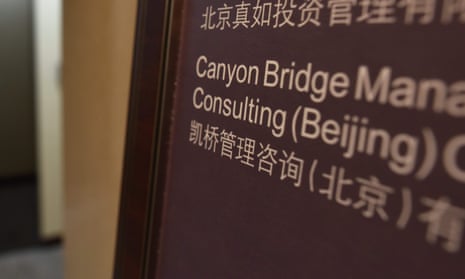A Chinese group that was stopped by Donald Trump from buying a US chip-maker last week has announced a £550m takeover of British chip designer Imagination Technologies.
Canyon Bridge Capital Partners’ all-cash offer for Imagination showed the buyout fund remained focused on investing in western chip-makers after its $1.3bn (£960m) deal to buy Lattice Semiconductor was blocked over US national security concerns.
Canyon Bridge said it would pay 182p a share for Imagination – a 42% premium on its closing price on Friday. However, the deal depends on Imagination selling US chip designer Mips, which it bought in 2013. The two companies said the takeover would not result in job cuts.
Selling Mips will avoid subjecting Canyon Bridge’s takeover of Imagination to a review by the Committee on Foreign Investment in the United States – the government panel that blocked its Lattice deal.
Imagination said it would sell Mips for $65m to Tallwood Venture Capital, an investment firm with offices in Palo Alto, California, and Wuxi, southern China.
Canyon Bridge was founded with capital from the Chinese government and has indirect links to Beijing’s space programme. It manages about $1.5bn on behalf of Yitai Capital Ltd, a Chinese state-owned company.
Imagination, whose chips have been used in devices including Apple’s iPhone, licenses graphics and video-processing technology to semiconductor companies. Shares in Imagination crashed 70% in April when Apple, its biggest customer, said it would stop using its graphics technology in its new products. The two companies remain in a legal dispute over royalties.
Lattice makes chips known as “field-programmable gate arrays”, which let companies put their own software on chips for different uses. It does not sell chips to the US military, but its two biggest rivals – Xilinx and Intel’s Altera – make chips that are used in military technology.
Following Trump’s decision to bar Canyon Bridge from buying Lattice, Steven Mnuchin, the US Treasury secretary, said the move reflected concerns about the transfer of intellectual property, Beijing’s role in the deal, the importance of semiconductor supply chain integrity to the US government, and the government’s use of Lattice products.
Canyon Bridge’s investment focus complements China’s efforts to move its manufacturers up the value chain and create innovative and competitive global conglomerates. In the past two years, the Chinese government has set aside at least 350bn yuan (£39bn) to invest in new technologies.

Comments (…)
Sign in or create your Guardian account to join the discussion